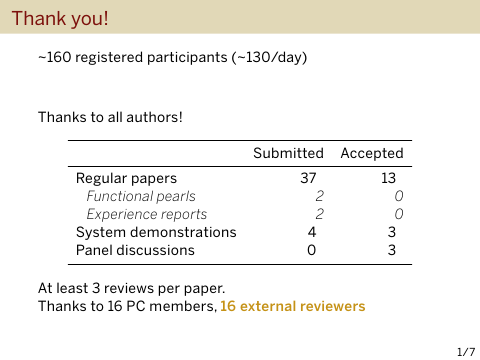
Thank you all for coming! There are about 160 people registered for the symposium, which includes about 130 people registered per day.
Thanks to everyone who submitted a paper! We received 37 papers [UPDATE: I misspoke; the actual number is 33], of which we accepted 13. Unfortunately, we could not accept the 2 of those submissions that were functional pearls, or the 2 of those submissions that were experience reports. I’m not sure what’s going on or whether we should do anything about it.
We received 4 demo proposals, and accepted 3 of them. We received 0 panel proposals, and accepted 3 of them. I mean, all the panels were the results of direct soliciting. There were 2 panels yesterday and 1 today. I don’t know if panels were a good idea; more on that later.
Each paper received at least 3 reviews. Thanks to the 16 PC members and 16 external reviewers who produced those thoughtful and informative reviews on a very tight schedule. Please give them a hand.
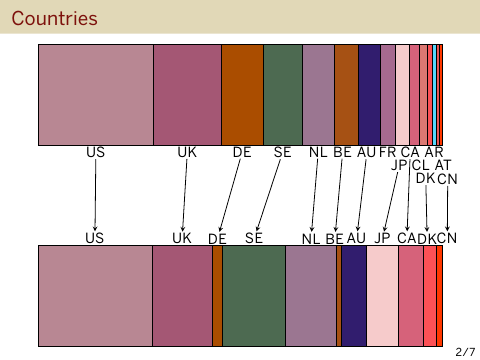
Here is a chart of the countries of authors of submitted papers (at the top) and of accepted papers (at the bottom). You can see the usual suspects to the left, and also to the right there were authors from Chile, Denmark, Argentina, Austria, and China, but only the papers from Denmark and China made it.
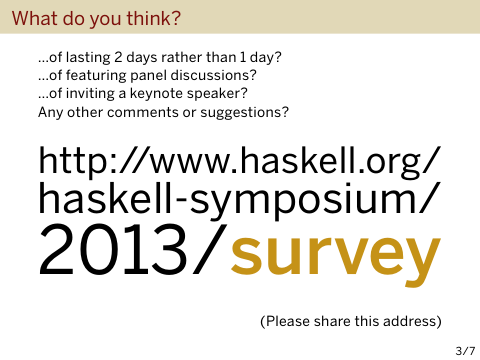
This year the symposium went to 2 days from 1 day, and the panels are new, and the keynote is new. I have no idea what you think of these format changes. I don’t even know many of you. So please take this survey (just take the URL of the symposium and put the word “survey” at the end) and let us know what you think!
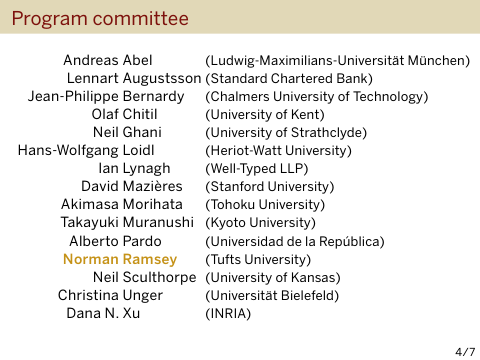
Again, thanks to the program committee, especially to Norman Ramsey for his sage advice.
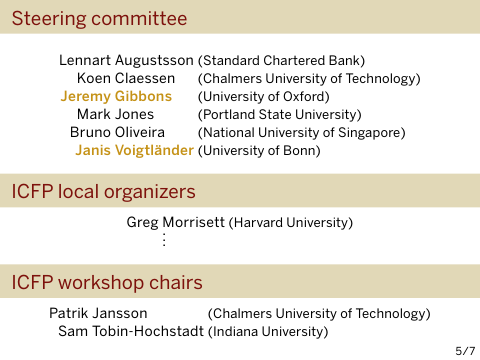
Thanks also to the steering committee, especially to Jeremy and Janis for their sage advice. Of course, this would not happen without the local organizers, starting with Greg Morrisett, and the workshop chairs, Patrik and Sam.
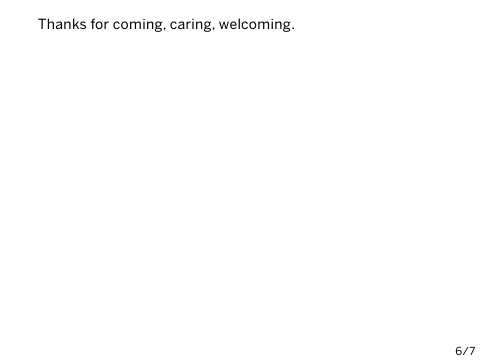
Thank you for coming, and thank you for caring so much about Haskell that you even came to a PC chair report at 9am. Thank you also for making the Haskell community such a welcoming place. Any questions?
I want to talk about the pain and pleasure of the Haskell community. The Haskell community is not such a welcoming place to a significant number of people. Regarding this, let me recall something Simon Peyton Jones said a long time ago. He was talking about how to write papers and handle reviews, but I think his advice applies just as well to personal interactions and the difficult task of communication in general.
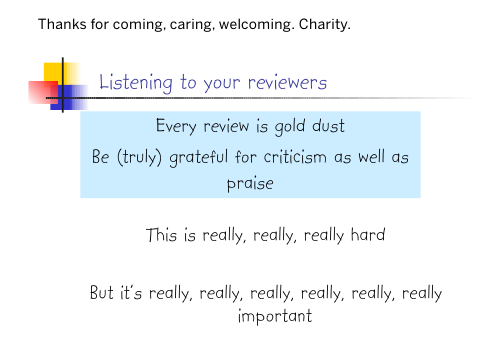
I want to remind ourselves, starting with myself, to be grateful for criticism as well as praise. Because we are among friends—friends who inspire us to do our better, to do our best.
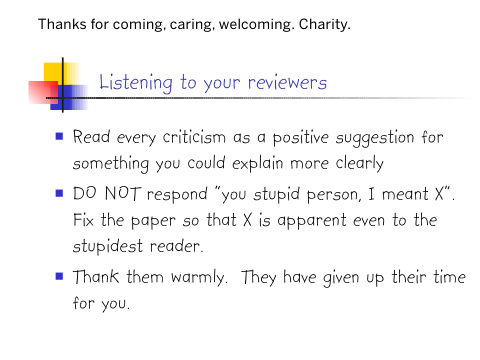
So I want to remember to interpret criticism as suggestions for improvement. Let’s thank those friends warmly, because they have given up their time. for us.

There are some specific ways in which the Haskell community has not been welcoming. We have harmed people disproportionately—I know; I have talked to them—due to how society is set up and their gender. We have harmed people disproportionately due to how society is set up and their race. Or their sexual orientation. Or differences between their gender and assigned gender. Or maybe due to the fact that not everyone grew up in their parents’ garage hacking category theory at age 14.
So, if you see harm—if you feel unwelcome—you. are. not. alone.
I showed you the country chart earlier. I didn’t show you the gender chart or the race chart, because I can only do so many sad things per day. There are horrible imbalances among the authors of this symposium. I think there were like two women. Of course you don’t have to write a paper to be a member of our community, but this is a tip of an iceberg. And I’m sorry for the tip and I’m sorry for the iceberg. I should have instituted double-blind reviewing and I didn’t. I’m sorry for that.
So what should we do about it? What am I doing about it? I want to tell you quickly about two things.

First, it’s high time we learned from those people who did not find the Haskell community a welcoming place. If you were excluded, or if you know someone who was, please share your stories. Of course you don’t have any obligation to do anything, but out of the goodness of your hearts, please be our teacher. Please contact me, at ccshan@indiana.edu. I’m getting help from some cultural anthropologists at Indiana University. If you know about anthropology at Indiana, you’ll know that these are professionals who really know how to learn from and respect your individual experiences and perspectives. We’re going to conduct interviews and anonymize them. Then, I’m not sure what we’ll do with the interviews—maybe they’ll become a SIGPLAN Notices article, or a theatrical play, or a shared resource if the interviewees are willing. In any case, the goal is to strengthen our empathy for each other, to understand our different perspectives on our shared community, and to open conversations about this important topic.
Second, as we have those conversations—indeed, whether we’re having a technical conversation or a social conversation, and whether it’s a communal discussion or a private one-on-one, let us: Be friendly, and speak our minds with compassion. Let us be charitable, and listen to others with compassion. Let us support one another, whether by speaking up or stepping back. And let us not burn out, and take care of ourselves, because this is hard, worthwhile, work. Just like it’s worthwhile to hack GHC or to write a clear paper or to give a sincere talk or to ask a helpful question or to write a respectful message on haskell-cafe or to glue together PHP and shell scripts to hold up our community infrastructure. None of us signed up for this work when we were born—I didn’t sign up for my native language to be the one not made fun of at my elementary school—so thank you for doing it.
Thanks to three amazing women—Ava DuVernay, Lindsey Kuper, and MrsB—for inspiring me to talk about this, and thanks to the SIGPLAN executive committee for their support.
I have time for a couple of short questions.